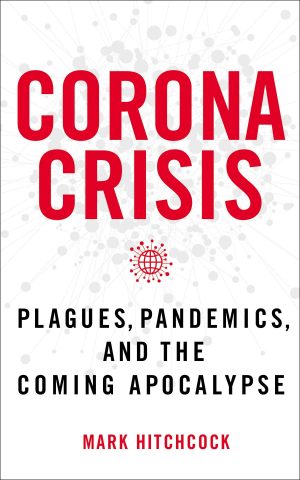The COVID-19 pandemic can be viewed through many interpretive lenses. In Corona Crisis, Mark Hitchcock views it through the lens of eschatology, that branch of Christian theology concerned with end-times events. Specifically, he views it through the lens of dispensational premillennialism.
Dispensational premillennialism holds a pessimistic view of history. The course of world history will become increasingly difficult before Jesus Christ raptures believers into Heaven, signaling the start of the seven-year Great Tribulation. In the first half of that tribulation, the Antichrist will unite the world under a global government and religion, promising peace. However, in the second half, that peace will turn into tyranny as the Antichrist persecutes with ferocious intensity those who have come to faith in Christ during that period. At the end of the Great Tribulation, Jesus Christ will visibly return to Earth (the Second Coming), establish his kingdom, and reign for 1,000 years (the Millennium).
The persistent temptation of dispensational premillennialism is date-setting. By this I mean the tendency of some dispensationalists to interpret current events as the fulfillment of biblical prophecy. The most notorious (and roundly mocked) recent example of this is Edgar C. Whisenant’s book, 88 Reasons Why the Rapture Will Be in 1988. The book caused a stir when it was published, but the date Whisenant identified came and went and believers were still here.
Corona Crisis is blessedly free of that kind of date-setting and eschatological speculation. In fact, Hitchcock specifically denies that the COVID-19 pandemic is a sign of the imminent Great Tribulation. Instead, he writes, “most of what we see today is not the direct fulfillment of end-time prophecy but rather a foreshadow of what will come after God’s people have been raptured to heaven” (28). He reiterates this point later in the book: “The coronavirus is not a fulfillment but a frightening foreshadow, a foretaste, of what lies ahead” (102). How does he know this? “The rapture has not occurred (the bride of Christ is still here)” (102–103).
Hitchcock’s anti-speculative bent was welcome to me. While he clearly believes Christians need to know how to read the “signs of the times” (Matthew 16:1–3), he places four parameters around that belief
- “First, we must shun a sensationalistic approach to current events and world headlines” (19).
- “Second, current events, headlines, and world news must be assessed in light of the Bible, not the other way around” (19).
- “A third important principle for signs of the times is to remember that they relate directly to Jesus’ second coming back to earth, not the rapture” (21).
- “One final parameter for signs of the times is that most of what we see today is not the direct fulfillment of end-time prophecy but rather a foreshadow of what will come after God’s people have been raptured to heaven” (28).
Given Hitchcock’s anti-speculative bent, the question that obviously arises is whether end-times prophecy is a helpful interpretive lens for viewing the COVID-19 pandemic. If dispensational premillennialism cannot differentiate whether this pandemic (or any other) is a sign of the times, what value does it have in interpreting the times? Hitchcock seems to answer this question when he writes, “I believe coronavirus is part of the stage setting for the end times.” (30). How so? It is “revealing the interconnectedness of the modern world as well as accelerating it.” Moreover, “COVID-19 is also speeding the rise of globalism. The pandemic intersects with the drive toward a one-world economy and government that will fall under the rule of a global strongman, the final Antichrist” (30–31).
Part of the difficulty with this kind of analysis is that it pushes in only one direction. Yes, there are globalizing trends in current history. There are also localizing trends, however. The push and pull of centralization and decentralization seems to be a constant of history, as empires rise, are resisted, and fall. Given this history, why should we assume that the present moment is the foreshadowing moment, rather than just another iteration of a longstanding cyclical pattern? Those who read events through the lens of biblical prophecy need to keep in mind that we have a bias for the normativity of the contemporaneous that may distort our views of both the past and future.
In saying this, I’m not making a comment about the correctness of dispensational premillennialism as an eschatological viewpoint. (Eschatology is a matter of dispute among evangelicals, and I don’t want to weigh in on that here.) I’m simply highlighting the difficulty of using such an eschatological viewpoint as a way of analyzing current events. Even Hitchcock concedes that until the rapture happens, we can only interpret the current pandemic as a foreshadowing of something worse to come, but we have no idea of the timeframe of the advent of that something worse.
Hitchcock ends Corona Crisis helpfully, and less controversially, with four biblical strategies: 1) maintain perspective, 2) take practical steps, 3) keep praying, and 4) proclaim the gospel (107–123). These four points evince a noncontroversial, unifying, evangelistic point of view. I’ll leave the last word to Hitchcock, a word that I heartily endorse: “Times of upheaval provide unique opportunities to hold out the gospel” (122).
Book Reviewed
Mark Hitchcock, Corona Crisis: Plagues, Pandemics, and the Coming Apocalypse (Nashville: Thomas Nelson, 2020).
P.S. If you liked this review, please click “Helpful” on my Amazon review page

